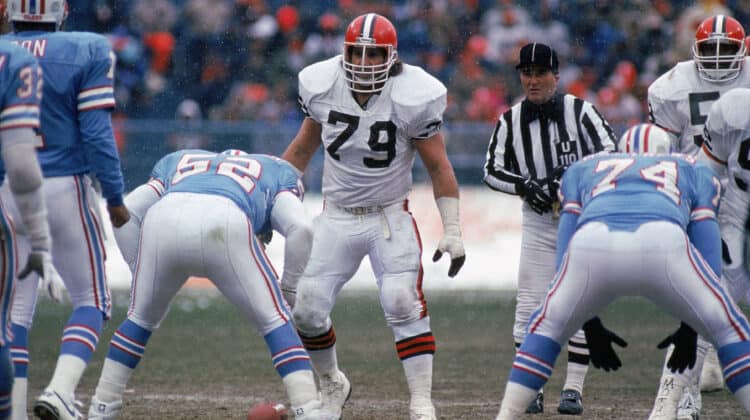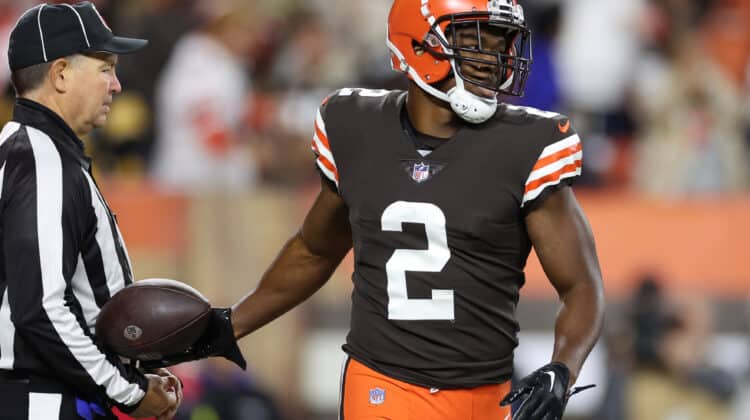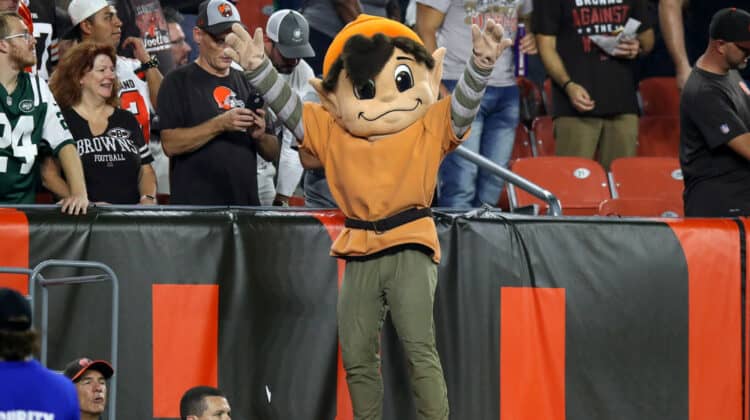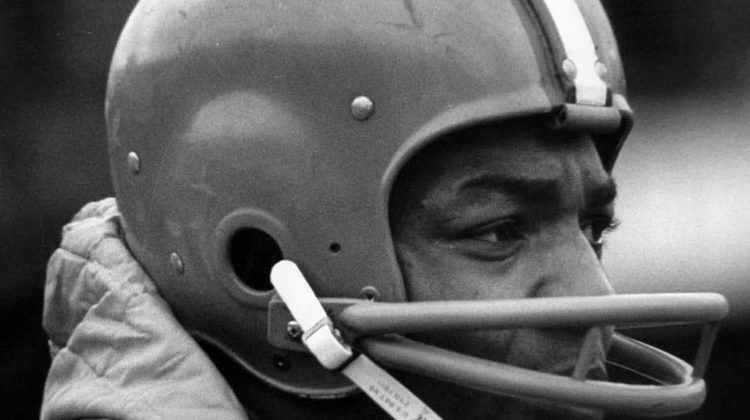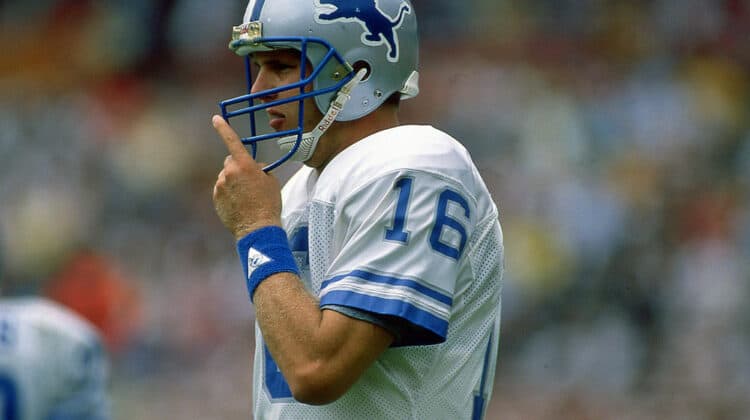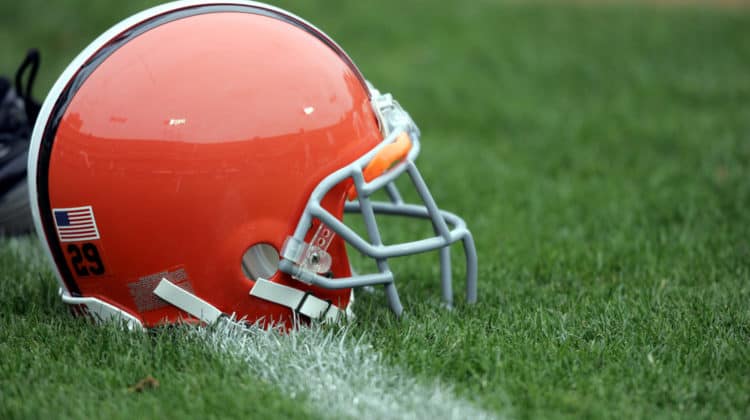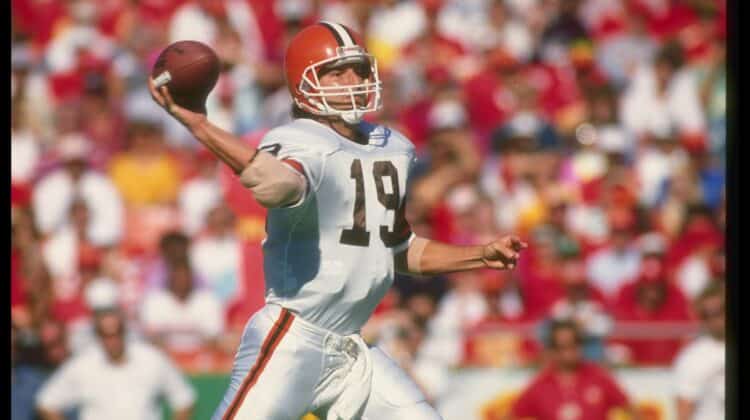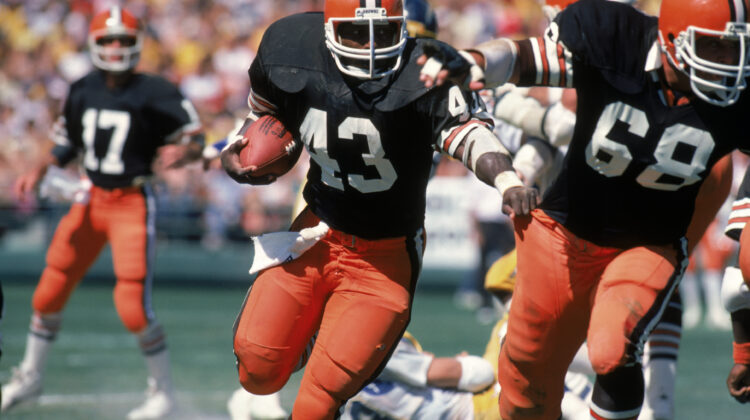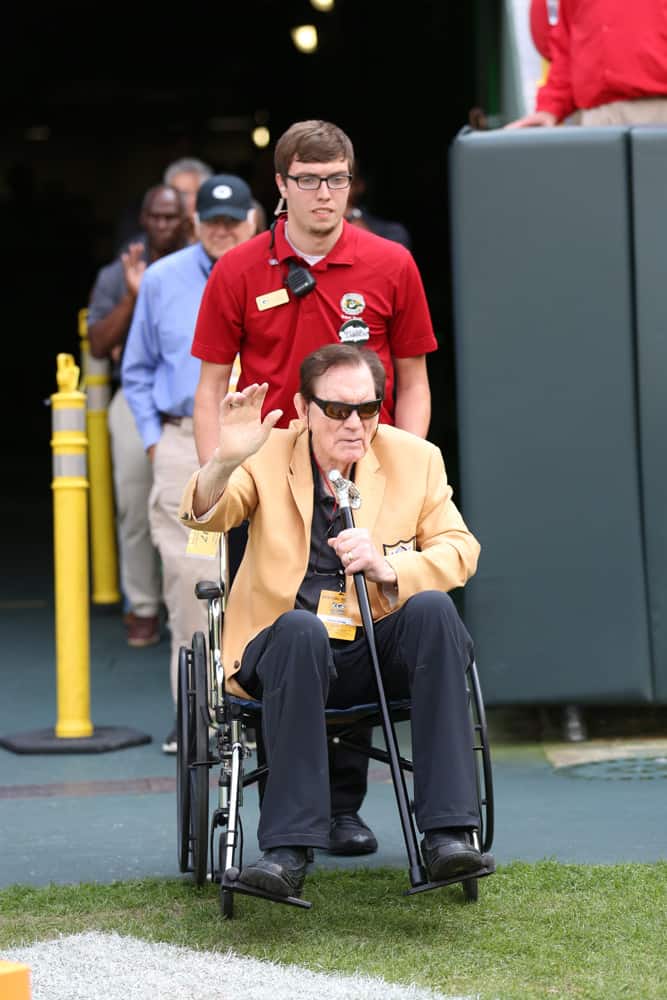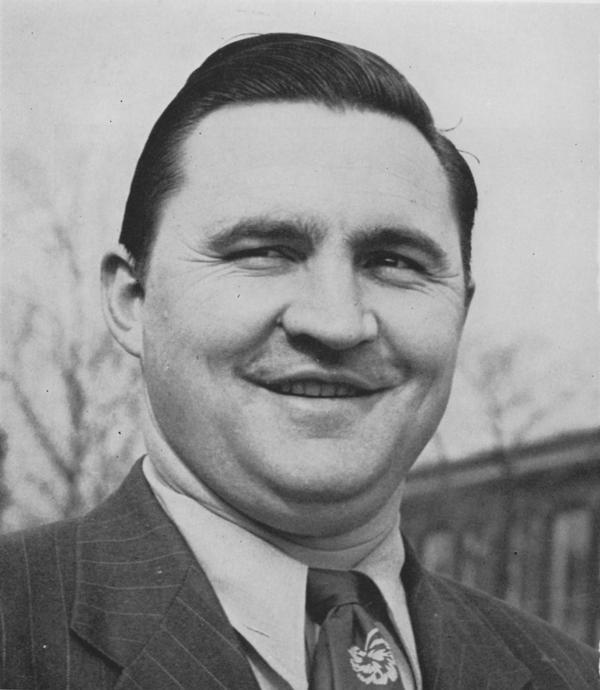
At last count, the Cleveland Browns franchise has had 18 non-interim head coaches in the franchise’s 74-year history.
The franchise started out with one an all-time great, Paul Brown, but the position has slowly declined in quality to the revolving cast of characters we see today.
We’re here to go through the greats though.
Despite the last 20 years, the franchise has seen great leaders take charge of the franchise.
Some men who were able to win it all, and others who came awfully close.
Take a trip down memory lane and relive some great moments.
These men were roaming the sidelines for nearly all the franchise’s greatest achievements.
10. Romeo Crennel
There is something about the assistants of Bill Belichick that NFL owners and executives just can’t stay away from.
The Browns are no different.
While he was still the defensive coordinator for the New England Patriots, and just before the 2003 playoffs began, Crennel interviewed for 6 head coaching jobs in 36 hours.
He wasn’t offered any at the time, but the writing was on the wall.
Crennel would be a head coach someday.
That day came in 2005 when Crennel was hired to replace Butch Davis.
Feb 6, 2005: The @Browns hired a branch from ye olde Belichick tree and named Romeo Crennel their new head coach. He seemed like a nice guy… it didn't work out. pic.twitter.com/I7ElgYnRRB
— Sad CLE Sports (@SadCleveland) February 6, 2019
Crennel had mixed results in his 4 seasons in charge fo the Browns.
In his first two seasons, the team went 6-10 and 4-12.
The Browns finished last or tied for last in those seasons.
However, in 2007 the Browns finished 10-6 and fell just short of making the playoffs.
It remains just the second winning record the franchise has had since it’s rebirth in 1999.
Last man to coach the #Cleveland @Browns to a winning record? Defensive genius Romeo Crennel in 2007, 10-6. @AroundTheNFL @MarcSesslerNFL pic.twitter.com/zR49tOzwOc
— Mike Malnicof (@MarvelousMike94) June 20, 2017
Crennel brought Browns fans back down to Earth in 2008 when the team slumped to a 4-12 season.
He was fired at seasons end.
Crennel’s time in Cleveland finished with a 24-40 record.
He would get another shot at being a head coach in the NFL though, with the Chiefs in 2011-12.
He’s still coaching in the league today, as the assistant head coach with the Houston Texans.
9. Bud Carson
Bud Carson Came to the Browns after 17 years as an NFL assistant around the league.
Directly before taking the Brown head coaching job Carson was the defensive coordinator for the New York Jets.
However, back in the 1970s he was the architect of the Steel Curtain defense of the Pittsburgh Steelers.
Carson took over in 1988 for Marty Schottenheimer who had been fired after a Wildcard Round playoff loss to the Houston Oilers.
Under Carson, the Browns rolled to a 9-6 record which was good enough for an AFC Central Division title.
In the playoffs the Browns did what they always did in those days, lose to John Elway and the Denver Broncos, this time in the AFC Championship game.
Joe Popp and Bud Carson of the #Cleveland @browns
Source:https://t.co/XW8OJJk7fN pic.twitter.com/KCUrO7vEEj— John Skrtic (@SkrticX) May 30, 2020
The following year Carson was fired midway through the year after a 2-7 start to the season.
You wouldn’t be alone in thinking the trigger was pulled a bit premature on Carson, considering the success of the year before, but just remember Art Modell is also the man who fired Paul Brown and sent Jim Brown packing.
In his defense, Modell said, “I saw a deterioration taking place. We had to stop the hemorrhaging.”
The team would finish with a 3-13 record on the season.
Carson left the Browns with an 11-13 record. It would be his only NFL head coaching job.
Carson would find his way back into a locker room the following season as a defensive coordinator with the Philadelphia Eagles.
He retired in 1997 after 1 season with the St. Louis Rams.
8. Forrest Gregg
Forrest Gregg came to the Browns in 1974 as the offensive line coach.
He had spent the first two years his coaching career in San Diego in the same role.
Perhaps he knew what was to come, or perhaps he was just lucky, but the move was a fortuitous one for Gregg because just a year later he was named head coach of the Cleveland Browns.
Gregg entered the coaching field with a large reputation given his career on the field.
He was a key player on the offensive line for Vince Lombardi’s Packers.
He was enshrined in the Hall of Fame for his efforts.
#Packers Forrest Gregg coached the #Browns and led the #Bengals to a Super Bowl appearance. Bart Starr led the Pack to the 1982 Playoffs. pic.twitter.com/fbFRoA4RbS
— Ken Gelman (@kengfunk) June 6, 2017
So it was expected that in just his 4th season as a coach he would begin to build the Browns in Lombardi’s Packers image.
He had the pedigree and education. What was overlooked was his lack of experience.
As it turns out, more respect should have been paid to experience because the Forrest Gregg experiment in Cleveland was a rocky one.
The Browns finished 3-11 in Gregg’s first season in charge, and at the bottom of the division.
The team had an uptick in results during the 1976 season at 9-5 but still missed the playoffs.
Gregg would not finish the third season as he was fired before the final game of the year with the Browns at 6-7 and out of playoff contention.
Gregg left the Browns with an 18-23 record.
He would get another shot at head coach with the Bengals, who he took to the Super Bowl in 1981, and the Packers.
Unfortunately for him, he would never win the trophy that was named after his old coach.
7. Butch Davis
Butch Davis rode the wave of his college success at Miami into a deal in Cleveland that gave him the dual role of head coach and general manager.
At the time, the move made some sense.
Davis had rebuilt the Miami Hurricanes into a national powerhouse after NCAA violations by the previous regime had decimated the program.
The Butch Davis reign lasted from 2001-2004 and has been the most successful of any head coach since the team returned to the city in 1999.
Davis oversaw some exciting moments in Browns history including Bottlegate, a league-leading 33 interceptions in his very first season, and the only Browns playoff appearance since 1999 in 2002.
Was Butch Davis coaching the Browns or starring in an elaborate Coach remake pic.twitter.com/jXrhR0GRP7
— seth galina (@pff_seth) September 23, 2019
Inconsistent quarterback play dogged Davis’s time in charge and he was forced to juggle Tim Couch, Kelly Holcomb, and later Jeff Garcia.
Butch Davis resigned in December 2004 after the team got off to a 3-8 start.
He ended his tenure with a 24-35 record.
In 2007, Davis returned to the college game at the University of North Carolina where he stayed until 2010 when he was forced out under a cloud of an academic misconduct scandal.
He is currently the head coach at Florida International University.
6. Nick Skorich
When Nick Skorich took over the Browns he didn’t exactly need an introduction to the players, staff, or facilities.
He’d already been around for 7 years as an assistant and offensive coordinator.
Skorich took over the Browns for a retiring Blanton Collier in 1971.
In 1970 the Browns finished with a 7-7 record, only their second non-winning season since 1946.
Skorich quickly righted the ship and took the Browns back over Mount .500 with a 9-5 record and a division title.
Friday, June 26, 2020
PROTECTION: Nick Skorich
By TJ Troup pic.twitter.com/18erlpVZAp— 𝐏𝐫𝐨 𝐅𝐨𝐨𝐭𝐛𝐚𝐥𝐥 𝐉𝐨𝐮𝐫𝐧𝐚𝐥🏈 (@NFL_Journal) June 26, 2020
1972 saw the Browns once again make the playoffs with a 10-4 record and they nearly knocked off the undefeated Dolphins in a 20-14 game in the playoffs.
Skorich’s final two seasons saw the retirements of legendary Browns players Leroy Kelly, Gene Hickerson, and Gary Collins.
The Browns were on a downward slide and the Browns struggled to replace their aging stars.
The Browns dropped to 7-5-2 and finally 4-10 in Skorich’s final two seasons.
He was fired after the 1974 season in which the Browns finished in last-place in the division for the first time in the franchise’s history.
Skorich finished his Browns tenure with a record of 30-26-2.
After leaving the Browns, Skorich worked for the league office as supervisor of officials.
5. Bill Belichick
The Belichick era of Browns football stirs many strong emotions in Browns’ fans.
Some saw his personality as off-putting.
He ran his press conferences with what appeared to be a bored indifference.
This gave fans the impression that he lacked enthusiasm for the job. As it turns out, that’s just how he runs his press conferences.
Belichick was also trying out running a football team that matched the environment it played in.
He was trying to build a big, brutish team to match the lakeside fall and winters in Cleveland.
This would struggle to bear fruit in Cleveland but blossomed in New England.
It was these things combined with a lack of wins that left Browns fans unmoved when he was no longer in charge of their franchise.
It was his success in New England that makes fans wish he’d been given a little bit more time.
Throwback Thursday: Cleveland Browns coach Bill Belichick for Starter (1994) pic.twitter.com/ksEZD07lpv
— Darren Rovell (@darrenrovell) February 1, 2018
Belichick suffered through 3 losing seasons and a quarterback controversy that saw fan-favorite Bernie Kosar find the bench in favor of Vinny Testaverde.
Finally in 1994 Belichick put together a winning season.
The team finished 11-5 and in second place in the division behind Pittsburgh.
Belichick proved his worth as a defensive coach as the team allowed the fewest points in the league.
That season ended in a 29-9 defeat to Pittsburgh in the divisional round of the playoffs.
1995 was Belichick and the Brown’s last season in Cleveland.
The team finished 5-11 after starting 3-1.
With the team on the move to Baltimore, Belichick was promised he could keep his job but Art Modell fired him anyway.
On this day 21 years ago, Bill Belichick was fired from the Cleveland Browns after going 37-45 with one playoff appearance in five seasons pic.twitter.com/QdbIjmBezh
— ThePostGame (@ThePostGame) February 15, 2017
Belichick finished his Cleveland career with a 37-45 record.
4. Sam Rutigliano
Sam Rutigliano is the picture of the American dream Norman Rockwell could have only imagined painting.
Rutigliano was born in Brooklyn, New York to Italian immigrant parents.
After a college football career at Tennessee and Tulsa, Rutigliano worked his way up to the top of the coaching ladder.
He started his coaching career in 1956 as a high school coach in Brooklyn and after 11 years got his first job in the NFL, as a wide receivers coach with the Broncos.
Rutigliano bounced around the NFL for 11 years as a positions coach before he got his first, and only, NFL head coaching job, with the Cleveland Browns.
Sam Rutigliano
The 5th Head Coach of the Cleveland Browns
Vintage #Browns pic.twitter.com/oB5fYuLkn8— Vintage Browns (@VintageBrowns) August 7, 2019
Rutigliano was the Browns top man for 6 seasons and oversaw the “Kardiac Kids” era of Browns football. Led by Brian Sipe, the Browns would win the AFC Central Division in 1980.
The most famous moment of Rutigliano’s career would occur that same year, but it’s one he’d probably rather forget. “Red Right 88”, the play that knocked the Browns out of the playoffs.
Despite the play, Rutigliano won NFL Coach of the Year honors that year, 1980.
While the team would never admit that the dramatic loss haunted the team, they would record a winning record in just 1 of Rutigliano’s final 4 seasons in charge.
After a 1-7 start to the 1984 season, Rutigliano was fired. In his 6 seasons in charge, Rutigliano compiled a 47-50 record.
#Cleveland @browns Coach Sam Rutigliano (1980). Source: @Cleveland_PL from Sam, Sipe, & Company. pic.twitter.com/UrseyuNXEu
— John Skrtic (@SkrticX) August 6, 2020
Rutigliano took a job in the NBC Sports booth for a few seasons and returned to coaching in 1988 at Liberty University.
He coached the Flames from 1989-1999.
3. Marty Schottenheimer
Marty Schottenheimer was and is a football man.
After a college career at Pitt, he played professionally for 6 seasons before hanging it up.
After an unfulfilling career in real estate after his playing career, Schottenheimer got back in the game as a coach.
After half a dozen season as a positions coach, Schottenheimer was given the job of defensive coordinator for the Browns under head coach Sam Rutigliano.
When Rutigliano was fired 4 seasons later, it was Schottenheimer who was given the top job, his first at any level.
With 1985 Supplemental Draft pick Bernie Kosar under center and Schottenheimer in charge, the Browns enjoyed their most successful run in 20 years.
Flashback Fri
In 1985 Cleveland Browns coached by Marty Schottenheimer won the AFC Central. Veteran Gary Danielson & rookie Bernie Kosar were the QBs. RBs Kevin Mack & Earnest Byner each rushed for over a 1000 yd. The beginning of several successful Browns seasons from 1986-1989 pic.twitter.com/aNi1SRJ7Vl— Tom Brunswick (@tom_brunswick) June 5, 2020
Schottenheimer led the Browns to three AFC Central Division titles, in 1985, 1986, and 1987.
However, playoff success continued to elude the franchise.
This era is well known for the notable playoff disasters known as “The Drive” and “The Fumble.”
With playoff failure becoming a part of the culture, and the Oilers and Bengals pulling away from the Browns, Art Modell pulled the trigger and fired Schottenheimer after the 1988 season.
Schottenheimer recorded a 44-27 record in the regular season and a 2-4 record in the playoffs.
He took the Browns to the playoffs 4 times in 5 seasons, and to the AFC Championship Game twice.
2. Blanton Collier
To say that Blanton Collier owes his career to Paul Brown isn’t exactly a fair characterization of the man’s great career, but their connection is perhaps the most important relationship in either man’s career.
Collier got his start coaching high school football in Kentucky, where he spent 16 years coaching Paris High School.
World War II took Collier from his native Kentucky to Chicago, where he joined Paul Brown’s coaching staff of the Great Lakes Bluejackets.
When Brown moved to Cleveland after the war to coach the Browns, Collier went with him.
Collier was Brown’s right-hand man for 7 years before he returned to Kentucky to be the head coach of the University of Kentucky.
While coaching the Wildcats, Collier had a solid, if unspectacular record.
He went 41-36-3 and failed to take the Wildcats to a bowl game.
He was named the SEC coach of the year in 1954.
Collier had a few assistants on his coaching staff that would go on to great careers of their own, including Don Shula and Howard Schnellenberger.
Brown brought Collier back into the fold for what proved to be his final season in charge of the Browns.
After Brown was fired, Collier was offered the job.
Collier insisted on getting the blessing of both his wife and Paul Brown before accepting the job, which he did.
Jim Brown conversing with new head coach Blanton Collier. Collier was the @Browns coach from 1963 to 1970, with an overall record of 76-34-2. Source: @Cleve_Memory July 23, 1963. pic.twitter.com/U0dP2XmJTC
— John Skrtic (@SkrticX) July 23, 2018
The soft-spoken Collier continued the Browns dominance early in his tenure, winning the NFL Championship in 1964 behind the legs of Jim Brown.
The Browns advanced to two more championship games, in 1968 and 1969, but lost them both.
Collier announced his retirement before the end of the 1970 season, citing problems with hearing loss.
In his eight years in charge, Collier recorded a 76-34-2 record and that 1964 NFL Championship.
1. Paul Brown
There is no figure greater in the history of football in Ohio than Paul Brown.
Brown grew up in Massillon, Ohio, the hotbed of football passion both before and after Brown’s influence.
After a college career at the University of Miami, Brown took a job coaching football at his alma mater, Massillon Washington High School.
After 5 state championships and 4 national championships, Brown was given the head coaching job at The Ohio State University, where he spent his freshman year of college before transferring to Miami.
Brown spent 3 seasons at Ohio State, winning an NCAA Championship in 1942 before the Navy came calling during World War II.
Brown was stationed at the Great Lakes Naval Training Station outside of Chicago and was given the duty of coaching the base’s football team, the Bluejackets.
The end of the war saw Brown take a job in the newly formed All-America Football Conference.
The newly formed Cleveland franchise offered Brown the highest paying salary of any football coach in the country and complete control over football matters.
75 years ago today Paul Brown signed on with a team that would later bear his name. A pioneer of the modern game as coach/GM/part owner Brown won all 4 AAFC Championships & 3 NFL Championships @Browns He helped break the @NFL color barrier. He was and will always be a #CLE legend pic.twitter.com/ilLQAs6BgV
— Chris Ronayne (@chrisronayne) February 6, 2020
Brown’s goal was simple. “I want to be what the New York Yankees are in baseball or Ben Hogan is in golf”, he said.
He did just that.
The Browns won four straight AAFC titles between 1946 and 1949 behind Brown’s leadership and the play of stars Otto Graham, Marion Motley, and Lou Groza.
The Browns’ success continued in the NFL after the AAFC folded.
The team would go on to win 3 NFL titles in 1950, 1954, and 1955.
Brown’s tenure in charge of the team that bore his name came to an end in 1963 after continued disagreements with owner, Art Modell.
Brown would continue his coaching career in the state of Ohio with the Cincinnati Bengals, whom he coached from 1968-1975.
Brown is recognized as an innovator for his numerous contributions to football.
Among those was the invention of the facemask, the practice squad, and the draw play.
Brown was also the first coach to scout his opponents, hire a full-time staff of assistants and test his players on their playbook knowledge.
Arguably his most important innovation was the breaking of the color barrier when he became the first head coach to sign African-American players to a professional football team.
Naming a team after a coach who has only just started coaching the team is a questionable move, but there is no doubt that he earned it for what he gave to the team and the game.
NEXT: The Life And Career Of "The Toe," Lou Groza (Complete Story)